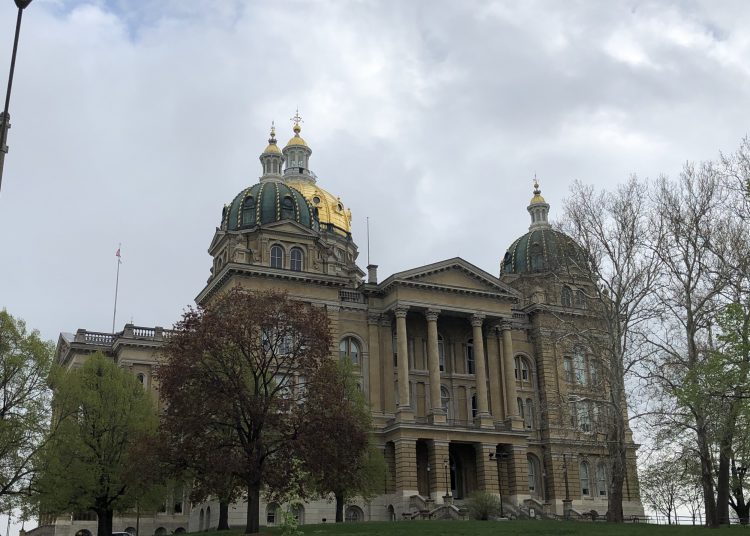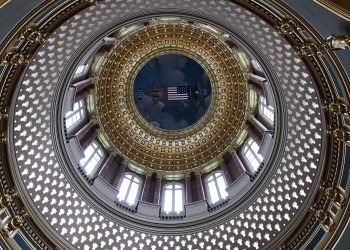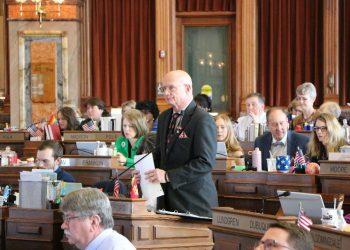DES MOINES, Iowa – The Iowa Senate passed a bill, HF 813, that expands the ability of parents and taxpayers to create charter schools independent of local school boards.
The bill passed with a 30 to 18 party-line vote on Wednesday. The bill passed in the Iowa House 55 to 40 in late March and will now head to Gov. Kim Reynolds’ desk.
In January, the Iowa Senate had passed similar language when they passed Gov. Kim Reynolds’ Students First Act, a larger education bill that included Education Savings Accounts. The Iowa House divided up Reynolds’ proposed bill into several pieces of legislation that did not include Education Savings Accounts.
Iowa’s current law only allows schools to obtain charters through the approval and oversight of local school districts, providing another public education option for parents. Charter schools now can only operate within the boundaries of the school district. There are only two authorized charter schools in the state, both high schools, one in Storm Lake and the other in Maynard.
The existing charter schools will continue to operate under the current code, but no new charter school can start under that chapter if the bill becomes law. HF 813 creates a new code chapter with two charter school models – the school board – state board model and the founding group – state board model.
The state board of education can approve charter school requests from founding groups created by local school districts who would operate a charter school within and as part of a school district as a new attendance center, part of an existing attendance center, or by converting an existing attendance center.
HF 813 also allows the state board of education to approve charter schools established by independent founding groups that create a charter school within the state’s boundaries that operates as a new attendance center independently from a public school district. The charter school would be overseen by a governing board, either elected or selected, based on the charter school’s contract with the state.
The governing board would be required to have a majority of members from the charter school’s geographical area. Those members not from the geographical area must be residents of Iowa. Governing board meetings would fall under the open meetings law, and the budget would be required to be made public.
The bill requires the Iowa Department of Education to monitor charter schools’ progress and establishes application and approval criteria for the state board of education to implement. Charter school contracts can be granted for five-year terms.
What makes charter schools unique is that they are exempt from all state statutes and rules and any local rule, regulation, or policy applicable to non-charter schools except for health and safety regulations and laws, nondiscrimination laws, they must be non-sectarian and non-religious, tuition-free, provide special education services, audit requirements, and transportation requirements.
Charter schools are also required to follow assessment and academic standards requirements under Iowa Code unless the state board of education provides a waiver in their application process. Charter schools under this bill must hire licensed teachers with the appropriate endorsements in the subjects they will teach.
The state board of education can also revoke a charter school charter if it fails to meet its contractual obligations, and the state board of education can deny a renewal request.
Each student enrolled in a charter school established under the bill is counted, for state school foundation purposes, in the student’s district of residence. Those districts are then responsible for paying the charter school an amount equal to the state cost per pupil during the previous school year, and the teacher leadership supplement state cost per pupil. There are additional funds required if a student is a non-English speaker or if a student is eligible for a postsecondary enrollment options program. One exception would be the first year that a former homeschool or private school student attends a charter school. In those cases, the state would pay.
During the debate, Senate Democrats offered 14 amendments.
State Senator Zach Walhs, D-Coralville, offered an amendment that required founding groups to be headquartered in Iowa and a majority of its officers to be residents of the state of Iowa.
All charter school organizations such as KIPP, Great Hearts, and Hillsdale College’s Charter School Initiative that provide structure, models, and curricula for new charter schools are located outside Iowa. The bill already requires all governing board members to be residents of the state, with a majority living within the geographical area of the school. Wahl’s amendment was defeated 18 to 30.
State Senator Claire Celsi, D-West Des Moines, offered an amendment that would require the education service provider to provide evidence of success serving a student population.
“The application will also include a description of the education service provider’s staff performance evaluation measures and compensation structure, methods of contract, contract oversight and dispute resolution, investment disclosures, and conflicts of interests. It will also provide evidence of the founding group’s success in serving student populations similar. In addition, if the application includes a proposal that the governing board contracts with an education service provider, the application should also include evidence from the service provider,” she said.
State Senator Amy Sinclair, R-Allerton, the bill’s manager, pointed out that the legislation already requires groups to outline past performance in their application to the state board of education. Celsi’s amendment failed 19 to 30.
Wahls offered another amendment that would prohibit a person that is part of the founding group or the person’s spouse or person related to either of them with consanguinity to the third degree (great-grandchild, niece, nephew, aunt, uncle, or great-grandparent) or relationship of affinity (relationship through marriage) from having ownership or a financial interest in an education service provider, a contractual relationship with an education service provider, or an interest that could be affected by the outcome of the application.
Sinclair noted there is already a conflict-of-interest policy within the bill. The amendment failed by an 18 to 30 vote.
State Senator Herman Quirmbach, D-Ames, offered an amendment that ensured charter schools and all of their operations, both in terms of admission of students and instruction and hiring and employment policies for staff, comply with the Iowa Civil Rights Code.
Sinclair pointed out that the bill already prohibits discrimination. Quirmbach countered that religious groups are exempt from aspects of the Iowa Civil Rights Code. However, the charter school bill explicitly states that schools are not to be non-sectarian and non-religious. The amendment failed 18 to 30.
State Senator Jackie Smith, D-Sioux City, offered an amendment that required charter schools to reimburse Area Education Agencies for services they provide for special needs children.
Sinclair responded, “The school district of residence is required to pay the charter the actual costs incurred for providing appropriate services. So the charter would simply be a flow through to the AEA.” The amendment was defeated 18 to 29.
Quirmbach offered another amendment that would require charter school administrators to be licensed principals through the Iowa Board of Educational Examiners.
Sinclair stated this amendment would quash a charter school’s ability to be innovative.
“The whole purpose of charter schools is to allow founding groups and local boards to be innovative and their delivery of instruction to students. Sometimes that means that it might be an art-focused, it might be a health sciences focused (charter school),” she said.
Sinclair shared the example of a charter school near Milwaukee, Wisc. that was a health science-focused charter school.
“It would limit the ability to be innovative, if we did not allow someone such as a medical doctor who had chosen to go into the service of prepping the next generation, and was deciding to be a chief administrator for a charter school to health science, to be a doctor who also wasn’t a school administrator,” she said.
Quirmbach rebutted, “When you get on an airplane to go someplace, you don’t want the pilot to be a cabin attendant. You want the pilot to be a licensed pilot. When you go in for surgery, you don’t want the surgeon to be an orderly, you want him to be a licensed medical doctor, preferably with appropriate licensing and certification in surgery. When we turn our children over our most precious asset, when we turn our children over to a school, we want the administrator to be someone who has demonstrated qualifications for being an administrator.”
The amendment failed 18 to 30.
Quirmbach offered a third amendment that would require employees of a charter school to fall under Iowa Code Chapter 20 and allow them to form a union and collectively bargain with the governing board.
Sinclair said that would also hamper innovation.
“The founding groups need to have the flexibility to have the control for staffing and compensation in a way that’s approved by the state board of education,” she said.
The amendment failed 18 to 30.
State Senator Liz Mathis, D-Cedar Rapids, offered an amendment that required all charter school employees to be mandatory reporters to report suspected or disclosed abuse and neglect to the Iowa Department of Human Services.
Sinclair pointed out that the bill requires all teachers to be licensed. Iowa Code states that all licensed school employees are considered mandatory reporters (including those in accredited non-public schools). Also, Iowa law does not require all employees at traditional public schools to be mandatory reporters.
She also pointed out that this was calling into question the intentions of Senate Republicans and the state board of education, insinuating that they would waive this requirement.
Mathis provided a rebuttal.
“What I’m talking about is all the other people that work in a charter school administrators, the school secretary, people who are mandatory reporters in a public school as well, not just teachers, but those who have intersections with that student, and especially with administrators who call students into their office and sometimes close the door, and they are alone with that student,” she replied.
School secretaries under Iowa law are not required to be licensed and are not considered mandatory reporters by law. However, school districts (and charter schools and non-public schools) can go beyond the law and require their employees to report abuse. Under the legislation, the primary contact with students – teachers – are mandatory reporters.
The amendment failed 18 to 30.
Mathis offered a second amendment requiring charter school students to be immunized. Sinclair responded, “I agree students ought to be immunized. The bill on page 15, line six says that all required federal, state, and local health and safety laws be met.”
The amendment failed on a voice vote.
State Senator Janet Petersen, D-Des Moines, offered an amendment that extended the five-year window that a child abused by a school employee (and would include charter school employees) could seek civil damages. The amendment was ruled not germane to the bill.
Celsi offered a second amendment requiring charter schools to hold public hearings for their budget before it is adopted.
Sinclair responded, “Budget information is required to be public information forum, and budgets are required to be submitted. This amendment is is unnecessary and redundant. And while I completely agree that there ought to be transparency and a lack of fraud, we don’t need an amendment to do it. The bill already covers it.”
The amendment failed 19 to 30.
Mathis brought up a third amendment that required charter schools to have school nurses. Current Iowa law requires public schools to “work toward” a goal of providing one nurse for every 750 students. The amendment lost 18 to 30.
Quirmbach introduced his fourth amendment that required charter schools to provide guidance counselors. The amendment was defeated 18 to 30.
That was the final amendment, and the chamber debated the primary bill.
Celsi said that charter schools were unnecessary and represented “unbridled capitalism.”
“There’s very little transparency and accountability. If history is a guide, we will be creating a parallel school system with a different set of rules. I have heard from exactly zero constituents who think this is a good idea. The out-of-state corporations who will swoop in to create unnecessary charter schools don’t usually contact people like me who advocate for public schools. Today’s a really sad day for Iowa. We’re trashing our one Sterling reputation for excellent excellence in public education and allowing unbridled capitalism to take over warning signs be damned,” she argued.
Sinclair, in her closing comments, said HF 813 is a good bill.
“Not all students thrive in a traditional classroom. Not all students are on a path towards college. Not all students should be held back to languish at the average. Not all students can succeed without focus support,” she explained. “House File 813 gives local public school boards the chance to be innovative in instructional delivery. House File 813 also creates a path for parents to have a hand in defining and creating the optimal public school learning environment for their child.”
















